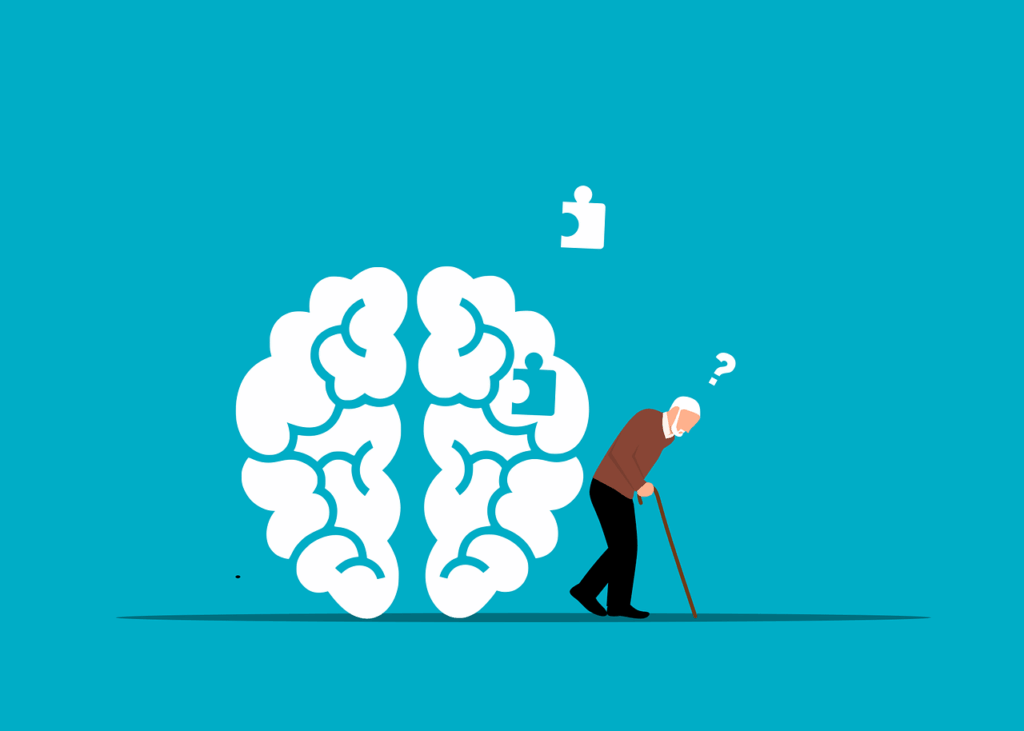
It’s natural to forget a name or misplace your keys once in a while. We all have those moments where a word is on the tip of our tongue, or we momentarily blank on an appointment. But when those slip-ups start happening more often, with increasing severity and disruption to daily routines, it can lead to a much bigger and more concerning question: Is this just typical aging, or could it be something more serious like Alzheimer’s disease?
Understanding this distinction is not just for peace of mind, but for proactive health management. Alzheimer’s is a progressive brain disease, and it stands as the most common cause of dementia, accounting for a significant 60-80% of all dementia cases. This condition causes a slow decline in memory, thinking, and reasoning skills, profoundly impacting an individual’s daily life and overall well-being. It’s important to remember that while dementia is an umbrella term describing changes in memory, thinking, or reasoning, Alzheimer’s is a specific, progressive illness within that broader category.
The good news is that recognizing these early warning signs can make a significant difference. Early detection matters, as it offers crucial opportunities for timely intervention and management strategies. These interventions may help to slow the disease’s progression, potentially enabling a better quality of life and sustained independence for longer. To help you navigate these often-unsettling changes, we’ve put together a comprehensive guide detailing 10 critical warning signs of early Alzheimer’s disease, meticulously contrasted with what might be considered typical age-related changes, empowering you to take informed next steps for your health or that of a loved one.
1. **Memory loss that disrupts daily life**One of the most common and often earliest signs of Alzheimer’s disease is memory loss, specifically forgetting recently learned information. This isn’t just about a fleeting moment of forgetfulness; it’s about a persistent and noticeable inability to retain new data. Individuals might frequently forget important dates or events that have just occurred, losing track of recent conversations or appointments that were just discussed.
A key indicator here is the repetitive nature of questioning. You might find a person asking the same questions over and over again, even after receiving an answer just moments before. This isn’t a lapse in attention but a failure to store the information in memory, leading to a continuous need for reiteration. This can be particularly frustrating for both the individual and their caregivers, highlighting the disruption to daily interactions.
Furthermore, this memory loss often manifests as an increasing reliance on memory aids. What used to be self-managed tasks now require constant reminder notes, electronic devices, or the direct assistance of family members. For instance, someone who previously managed their schedule effortlessly might now need their spouse to remind them of every upcoming event or task. This shift from independence to reliance is a significant red flag, indicating a deeper cognitive change at play.
It’s important to differentiate this from typical age-related changes. It is common for older adults to sometimes forget names or appointments, but the crucial distinction is that they usually remember them later. With Alzheimer’s, the information isn’t just temporarily inaccessible; it often isn’t properly encoded or retrieved, leading to a more persistent and disruptive form of memory impairment that impacts fundamental aspects of daily living.
Read more about: Beyond the Brochure: 12 Modern Car Features That Promise Innovation But Deliver Frustration
2. **Challenges in planning or solving problems**Another early warning sign involves noticeable changes in an individual’s ability to develop, follow, or execute plans. This goes beyond simple distraction; it points to a decline in complex cognitive functions like executive planning and problem-solving. Tasks that require sequential steps or logical thought processes become increasingly difficult to manage.
For example, a person who once enjoyed cooking might now have significant trouble following a familiar recipe, mixing up steps or forgetting ingredients. Similarly, managing monthly bills, a task requiring organization, calculation, and foresight, can become an overwhelming challenge. The ability to track financial obligations, reconcile statements, or pay bills on time may diminish, leading to potential financial difficulties and stress.
Alongside these planning difficulties, there’s often a significant decrease in concentration. What once took a reasonable amount of time to complete now takes much longer, requiring extended periods of focus that the individual struggles to sustain. This extended duration for tasks indicates a slowing of cognitive processing and a reduced capacity for sustained mental effort, making even routine activities arduous.
In contrast, typical age-related changes might involve making occasional errors when managing finances or household bills. These are usually isolated incidents, quickly corrected, or easily understood as minor oversights. The difference with Alzheimer’s is the consistent nature of these challenges and their impact on the ability to independently manage and navigate daily life, requiring more than just a quick check or simple correction.
Read more about: Did You Know? The Mental Moves & Surprising Hobbies Keeping Ryan Reynolds Grounded and Genius

3. **Difficulty completing familiar tasks**People experiencing early Alzheimer’s disease often find it increasingly hard to complete daily tasks that were once second nature. This difficulty isn’t about learning a new skill; it’s about performing established routines and activities that have been practiced countless times throughout their lives. The automaticity of these actions begins to erode, requiring conscious effort and often leading to errors or inability to complete them.
Consider the act of driving to a familiar location. Someone with early Alzheimer’s might suddenly have trouble navigating a route they’ve taken for decades, getting lost or becoming disoriented in well-known areas. This breakdown in spatial memory and routine execution can be profoundly unsettling and poses significant safety concerns, impacting their independence and mobility.
Similarly, organizing a grocery list, a seemingly simple task, can become a monumental hurdle. They may struggle to categorize items, forget what they need, or even how to structure the list effectively. The rules of a favorite game, once effortlessly recalled, might now evade them, leading to frustration and withdrawal from activities they once enjoyed with friends and family.
This is distinctly different from occasionally needing help to use complex microwave settings or to record a television show. Those are often related to unfamiliar technology or a minor lapse in memory for specific instructions. With Alzheimer’s, the struggle extends to core, familiar tasks that have been integral to their daily living for years, fundamentally altering their capacity to function without assistance.
Read more about: Viral Video Prompts Debate Over Safety Training at Lowe’s
4. **Confusion with time or place**Losing track of dates, seasons, and the general passage of time is a significant warning sign that points towards early Alzheimer’s disease. This isn’t just forgetting what day of the week it is; it’s a deeper disorientation regarding temporal sequences and personal timelines. The individual may struggle to grasp the current season, the month, or even the year, leading to bewilderment about their present circumstances.
Furthermore, understanding events that are not happening immediately can become a challenge. The concept of past or future plans may lose its coherence, making it difficult to follow narratives or anticipate upcoming events. If something isn’t directly in front of them or occurring at that exact moment, it may not register or make sense, creating a disconnect from their ongoing reality.
This confusion also extends to spatial orientation. Individuals may forget where they are, even in highly familiar environments like their own home or neighborhood. They might also struggle to recall how they got to a particular place, even if they’ve just arrived. This profound geographical disorientation can be frightening and dangerous, increasing the risk of getting lost and being unable to return home.
In contrast, a typical age-related change might involve getting confused about the day of the week, but ultimately figuring it out later with a quick check of a calendar or a brief thought. The difference lies in the persistence and severity of the confusion, and the inability to self-correct or reorient themselves, indicating a deeper cognitive impairment that disrupts their fundamental sense of time and place.
Read more about: Unpacking the Legacy: 12 Pivotal Chapters in the Illustrious Life of George Washington

5. **Trouble understanding visual images and spatial relationships**For some individuals, a warning sign of Alzheimer’s can manifest as vision problems that go beyond typical age-related issues. This isn’t about cataracts, which are a common and treatable part of aging eye health. Instead, it involves cognitive difficulties in processing and interpreting visual information, affecting how the brain understands what the eyes see.
These visual challenges can lead to a range of difficulties, including problems with balance. If the brain struggles to accurately interpret distances and spatial relationships, it can impair coordination and increase the risk of falls. Reading can also become problematic, not due to blurry vision, but because the individual has trouble tracking lines of text or distinguishing words and letters on a page.
Furthermore, problems judging distance and determining color or contrast are common. This can severely impact daily activities, particularly driving, where accurate perception of speed, distance, and environmental cues is paramount. Misinterpreting traffic signals, failing to judge the distance to other cars, or struggling with low-light conditions become dangerous symptoms of this cognitive-visual decline.
It is crucial to distinguish these issues from typical age-related vision changes, such as those caused by cataracts, which affect the physical clarity of vision and can often be corrected. With Alzheimer’s, the eyes may be healthy, but the brain’s ability to make sense of the visual input is compromised, leading to profound and often inexplicable difficulties in navigating the world visually.
Read more about: Beyond the Glamour: When Film Productions Become ‘Problem Children’ and Test Every Crew’s Mettle
6. **New problems with words in speaking or writing**Beyond simple forgetfulness, individuals in the early stages of Alzheimer’s disease may begin to struggle noticeably with language, both in spoken conversation and written communication. This often manifests as difficulty following or joining a conversation, as their ability to process and contribute to dialogue becomes impaired. They might frequently stop abruptly in the middle of a sentence, completely losing their train of thought and having no idea how to continue, making communication frustrating for everyone involved.
Vocabulary challenges are another prominent feature of this warning sign. A person may struggle significantly with finding the right word, often substituting familiar objects with incorrect or roundabout descriptions, such as calling a “watch” a “hand-clock.” They might repeat themselves frequently, a consequence of both memory issues and the struggle to formulate new thoughts or recall previous statements. This persistent difficulty goes far beyond an occasional slip of the tongue.
These linguistic hurdles can profoundly impact daily interactions and the individual’s ability to express themselves or understand others, leading to increased isolation. Tasks like writing a simple email or understanding a book become daunting, as the cognitive effort required to process and produce language is severely compromised. It affects the core of how we interact with the world and connect with others.
It is crucial to differentiate this from the typical age-related change of sometimes having trouble finding the right word. While most people occasionally experience a word being on the tip of their tongue, those with Alzheimer’s face consistent and pervasive difficulty that disrupts entire conversations and their capacity to communicate effectively, rather than just momentary retrieval issues.
Read more about: Beyond the Glitz: 15 Non-Negotiable Rules for New Celebrity Assistants Managing Star Travel and Life

7. **Misplacing things and losing the ability to retrace steps**A hallmark symptom of early Alzheimer’s disease is the tendency to misplace items in unusual or illogical locations, far beyond the occasional forgotten keys. A person might put their phone in the freezer, or store important documents in a kitchen cupboard, demonstrating a significant disorganization in their thought processes regarding object placement. What’s more concerning is their inability to go back over their steps to find these lost items.
This isn’t merely forgetting where something is; it’s a breakdown in the cognitive function that allows us to recall recent actions and mentally retrace our path. When items are repeatedly lost without the capacity to logically search for them, it leads to immense frustration. As the disease progresses, individuals may even accuse others of stealing their misplaced belongings, a common and distressing symptom rooted in their inability to remember where they put things.
Such frequent misplacement, coupled with the inability to retrace steps, can profoundly disrupt daily life. Essential items like medication, identification, or wallets can be lost, creating practical problems and potential safety risks. The loss of personal belongings can also heighten feelings of anxiety and vulnerability, impacting their sense of security and control.
This behavior stands in stark contrast to typical age-related changes, where people might misplace things from time to time but can usually retrace their steps or eventually remember where they put them. The key distinction with Alzheimer’s is the unusual nature of the hiding spots and the persistent, unresolvable inability to recall the actions that led to the item’s current location, indicating a more severe memory and reasoning impairment.
For family members and caregivers, observing a loved one placing items in bizarre locations and then being unable to find them or blaming others is a significant red flag. It’s a clear indication that cognitive functions related to memory, spatial reasoning, and logical problem-solving are being profoundly affected, warranting immediate medical attention for further evaluation and support.

8. **Decreased or poor judgment**Changes in judgment and decision-making capabilities are another significant early warning sign of Alzheimer’s disease. This can manifest in various ways, often impacting an individual’s financial stability and personal well-being. They may start to use poor judgment when dealing with money, making impulsive purchases, falling victim to scams, or giving away large sums to telemarketers or strangers, demonstrating a diminished ability to assess risk and consequences.
Beyond financial matters, a noticeable decline in judgment often extends to personal care and hygiene. An individual may begin to pay less attention to grooming, neglecting to change clothes, shower regularly, or keep themselves clean. What was once a routine part of their day becomes an overlooked detail, indicating a decrease in self-awareness and the ability to maintain personal standards, which can also raise concerns for those around them.
These lapses in judgment have serious implications for an individual’s safety, independence, and social standing. Poor decisions can lead to financial exploitation, health issues due to neglect, or social isolation if personal appearance or behavior becomes noticeably inappropriate. These are not isolated incidents but rather a consistent pattern of impaired reasoning that affects their daily functioning and safety.
It is important to distinguish these persistent and impactful changes from typical age-related errors, such as making a bad decision or mistake once in a while, like neglecting to change the oil in the car. While anyone can make an occasional oversight, the frequent and often detrimental poor judgment seen in early Alzheimer’s is indicative of a more pervasive cognitive decline that affects critical life decisions and self-care, demanding professional evaluation.
Such consistent poor judgment is more than just a momentary lapse; it reflects a fundamental shift in the brain’s ability to weigh options, understand consequences, and make rational choices. Observing these changes in a loved one should prompt a conversation with a healthcare provider, as they can have far-reaching effects on their health, safety, and financial security, underscoring the urgency of early intervention.
Read more about: 12 Evidence-Based Techniques to Naturally Manage Anxiety and Reclaim Your Calm

9. **Withdrawal from work or social activities**Individuals experiencing early Alzheimer’s disease often begin to withdraw from activities they once cherished, including work, hobbies, and social engagements. This withdrawal is not necessarily a choice but a consequence of the cognitive changes impacting their ability to participate. Difficulty holding or following a conversation, as described earlier, can be a major factor, making social interactions overwhelming and leading to self-imposed isolation.
This symptom goes beyond occasional disinterest; it reflects a deeper struggle to engage with the world. A person might stop pursuing hobbies they once loved, perhaps because they can no longer remember the rules of a favorite game or feel too confused to follow the plot of a book or movie. Keeping up with a favorite sports team or activity, which requires retaining new information and following complex narratives, can also become challenging, leading to a loss of enjoyment and participation.
The reasons for withdrawal are often complex, stemming from a combination of confusion, embarrassment, or anxiety about their declining abilities. The effort required to understand and respond in social settings becomes exhausting, making it easier to simply avoid them. This can be particularly heartbreaking for family and friends who witness a loved one becoming less engaged and present.
In contrast, typical age-related changes might involve occasionally feeling uninterested or weary of work, family, or social obligations. These feelings are usually temporary, and individuals still maintain the capacity to engage when they choose. With Alzheimer’s, the withdrawal is driven by a genuine inability to manage the demands of these activities, leading to a consistent pattern of avoidance and reduced participation that significantly impacts their quality of life.
Observing a loved one consistently pulling back from activities they once found fulfilling is a strong indicator of cognitive changes that require attention. It affects not only the individual’s well-being but also their support network, as crucial social connections diminish. Understanding this symptom helps families recognize the need for professional guidance and strategies to maintain meaningful engagement, even as the disease progresses.
Read more about: Navigating Your Golden Years: A Comprehensive Guide to the Pros and Cons of Early Retirement vs. Working Longer
10. **Changes in mood and personality**One of the most emotionally challenging warning signs for families to witness is the significant shift in mood and personality that can accompany early Alzheimer’s disease. Individuals may become uncharacteristically confused, suspicious of others (even close family members), depressed, fearful, or anxious. These changes are not simply a reflection of ‘having a bad day’ but represent fundamental alterations in their emotional regulation and perception of the world.
These personality shifts often manifest as an increased ease of being upset, whether at home, with friends, or especially when taken out of their established comfort zone. Routine disruptions, minor changes in plans, or unfamiliar environments can trigger disproportionate reactions of irritability, anger, or distress. This hypersensitivity to change highlights their struggle to adapt to new situations or process unexpected information, making everyday life increasingly challenging.
Such profound changes in mood and personality can strain relationships, causing confusion and hurt among loved ones who may not understand the underlying cause. What appears to be an intentional change in behavior is, in fact, a symptom of the disease affecting the brain areas responsible for emotional processing and social conduct. It’s a challenging aspect that requires immense patience and empathy from caregivers.
It is crucial to distinguish these pervasive changes from a typical age-related trait like developing very specific ways of doing things and becoming irritable when a routine is disrupted. While some older adults may prefer routine, the emotional lability and fundamental shifts in core personality traits seen in Alzheimer’s are far more severe and persistent, deeply altering the individual’s character and emotional landscape.
Recognizing these changes as potential warning signs of Alzheimer’s is vital for seeking a timely diagnosis and developing appropriate coping strategies. It empowers families to understand that these behaviors are symptoms of a disease, not intentional acts, fostering a more compassionate and informed approach to care and support. Early intervention can help manage some of these symptoms and provide resources for both the individual and their caregivers.
**Taking Action: When to Seek Medical Evaluation and Support**
Observing any of these 10 warning signs in yourself or a loved one can be unsettling, and it’s natural to feel uncertain or nervous about discussing such changes. However, it’s absolutely critical not to ignore them. Early detection truly matters and offers crucial opportunities for timely intervention and management strategies that can significantly impact the course of the disease. While it’s tempting to write off these changes as “just getting older,” persistent signs of memory loss, confusion, or behavioral shifts warrant immediate medical attention.
Schedule an appointment with your doctor as soon as possible. It can be incredibly helpful to bring a close friend or family member to this appointment, as they may have noticed changes you haven’t recognized in yourself, or they can provide a different perspective on the observed symptoms. Being honest about how these changes are affecting daily life is paramount. Remember, there’s no one definitive test to diagnose Alzheimer’s; instead, doctors use a combination of medical history, neurological exams, brain imaging, and other diagnostic tools to achieve the most accurate diagnosis.
Early diagnosis empowers you and your family with more treatment options and more time to plan. Treatments like aducanumab (Aduhelm™) and lecanemab (Leqembi™), approved by the FDA, are designed to treat patients in the early stages and may help to slow the disease’s progression, potentially enabling a better quality of life and sustained independence for longer. These therapies can help to reduce cognitive decline by targeting amyloid plaques, which are hallmarks of the disease, allowing individuals to actively participate in daily life and hold onto memories longer.
Supporting a loved one through a potential Alzheimer’s diagnosis and its progression requires immense empathy and strategy. Start by listening without judgment, acknowledging their fears and frustrations, and encouraging them to talk with medical professionals. Offer to accompany them to appointments, help track symptoms, and simply be a steady presence. As cognitive changes progress, establishing routines, labeling items, and ensuring safety in the home become increasingly important to help them maintain orientation and confidence.
Read more about: Transform Your Home: Simple Backyard Projects That Instantly Boost Your Curb Appeal
Ultimately, you are not alone in this journey. If caregiving becomes overwhelming, remember to reach out for help; support groups, memory care programs, and respite care options are available to assist. Recognizing the difference between natural aging and the signs of Alzheimer’s begins with awareness and action. Starting the conversation early gives you more time to plan, more options for care, and greater peace of mind for everyone involved, emphasizing that proactive engagement is the best path forward for brain health and overall well-being.








